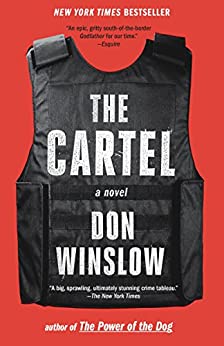More on this book
Community
Kindle Notes & Highlights
The so-called Mexican drug problem isn’t the Mexican drug problem. It’s the American drug problem.
at the end of the day men are like stockings—no matter how well you take care of them, they eventually run on you.
cell phones are like women—you use them once or twice and then throw them away.
The Mexicans have finally found a drug that white trash likes and can afford. And one thing you ain’t never gonna run out of is white trash.
North Americans smoke the dope, snort the coke, shoot the heroin, do the meth, and then have the nerve to point south (down, of course, on the map), and wag their fingers at the “Mexican drug problem” and Mexican corruption.
It’s not the “Mexican drug problem,” Pablo thinks now, it’s the North American drug problem.
how corrupt does a society have to be when its citizens need to get high to escape their reality, at the cost of bloodshed and suffering of their neighbors?
It’s vastly complicated, Keller knows. Aguilar can’t know how high up the corruption goes, or how thorough it is. His boss, the attorney general, was appointed by the president. And is his own organization, SEIDO, clean? He doesn’t know if he can trust the people he works for, or the people who work for him. It isn’t just bureaucratic backstabbing—the chance of losing a job or even a career. It’s life and death.
Something Keller’s learned over the years—if the answer isn’t in the present, it’s usually in the past.
Keller had a professor in college who said that civilization was a matter of plumbing. That basically, the infrastructure for moving clean water in and filthy water out is what allowed people to congregate in large populations in permanent dwellings and create cities and cultures. Otherwise, people had to be nomads to literally escape their own shit.
every successful operation ends in a betrayal.
Satan can only tempt you with what you already have.
Betrayals start that way, with lies hidden in the shadows of silence.
“It’s a new world now. Every war you fight, you fight on three fronts: a shooting war; a political war; a media war. And that you can’t win one without the others.”
Mexico has formalized the militarization of the drug war; the U.S. is drifting in that direction.
Americans take their strength in victories, Mexicans’ strength is in their ability to suffer loss.
you do not avenge a murder by killing—you avenge it by living.”
Keller mentions Roberto Bolano, Luis Urrea, and Elmer Mendoza, among others.
Ports are important to the cartels not so much for the product they send out as for the product they bring in—the precursor chemicals needed to fuel their methamphetamine super-factories,
the chemicals that come mostly from China.
No one ever came to her for help who didn’t get it, for kindness that didn’t receive it, for support who didn’t find it. She lived with dignity, courage, and purpose…and
he has that North American belief that every problem has a solution, whereas a Mexican knows that this isn’t necessarily true.
You’d think that there would be a breaking point—a decisive moment—but there is no single moment or event that you can put your finger on. No, it’s not that dramatic—it’s the dull, monotonous process of erosion.
It’s amazing, Keller thinks, the human capacity—perhaps born of need—to establish a sense of normalcy in the most abnormal conditions. They live in a virtual war zone, under a constant state of threat, and yet they’ve evolved into doing the little routines that make up a normal life.
the mushrooming of the maquiladoras changed the landscape of Juárez forever, creating the vast colonias where the people who can find jobs now struggle to survive on a third of what they used to make. Their poverty makes them targets for narco recruitment, their despair makes them customers for the narcos’ product.
What do you do with what’s left of your life?
So what are you going to do? Take your pension, find a condo in Tucson, become that pathetic middle-aged guy you find at sports bars at two in the afternoon? Take up golf? Brew your own beer? Read the great books? Hang around until you get the bad biopsy and in the meantime try to convince yourself that you haven’t done what you’ve done, seen what you’ve seen, that your nightmares are the stuff of fantasy and not just a slightly more surreal depiction of your surreal life?
He has no need of God, he decides, and God has no need of him.
Call it penance, call it atonement or whatever the hell you want, he only knows that he needs to do it, that he can only find redemption by helping this boy find his, by showing love to what he hates, that at the end of the day or the end of the world, there are no separate souls.
Sometimes they’re tempted to go back, to try to find what they lost, but they know that some things once destroyed can’t be rebuilt. Loss is loss.
The drugs still flow out of Mexico into the American Southwest, a more abundant commodity now than water. A few of the machine’s most monstrous cogs are missing, but its wheels still turn. Banking, real estate, energy, politics, armaments, walls, fences, cops, courts, and prisons—the cartel carries on.
We are all cripples, Keller thinks, limping together through this crippled world. It’s what we owe to each other.


